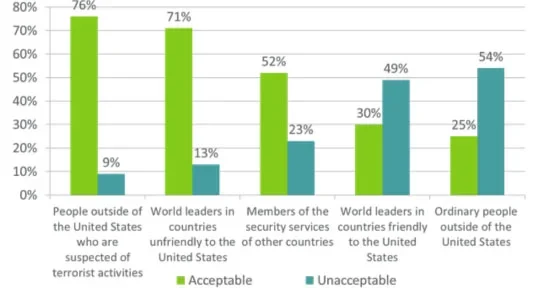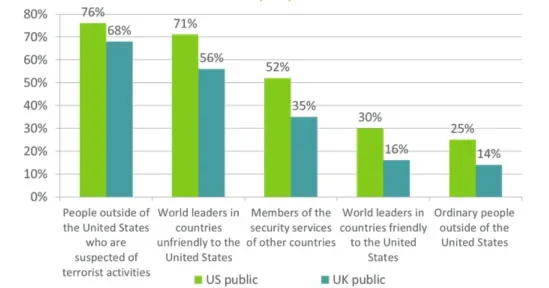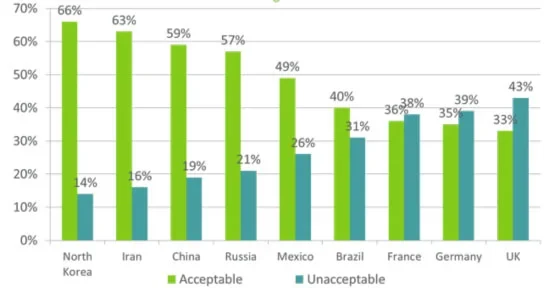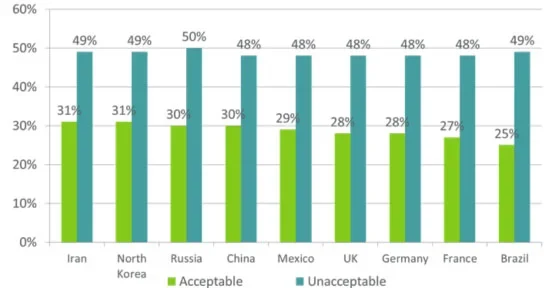Following revelations from Edward Snowden that the US Government had bugged Chancellor Angela Merkel's mobile phone, we asked the United States public for their views on the legitimacy of intercepting communications from leaders and citizens across other countries.
A majority of US citizens feel it acceptable to intercept the communications of people outside of the country who are suspected of terrorism (76%), of world leaders in countries unfriendly to the United States (71%) and members of security services of other countries (52%). In addition, three in ten (30%) feel it acceptable to intercept communications of world leaders in countries friendly to the United States and one in four (25%) for US security services to intercept the communications of ordinary people in other countries.
In all cases, other than whether it is acceptable to intercept communications of ordinary people outside the country, the proportion finding interceptions acceptable rises with Age. For example, 59% of those aged 18 to 34 find it acceptable to intercept communications of people outside of the US who are suspected of terrorist activity, rising to 75% of those aged 35 to 54 and peaking at 88% of those aged 55 or over.

When the same survey was completed by a nationally representative sample in the United Kingdom, the order of proportions finding each acceptable remained the same. The actual proportions agreeing varied quite largely, however, from 68% finding it acceptable that the United States intercept communications from people outside the country suspected of terrorist activity to just one in seven (14%) finding the interception of communications among ordinary citizens outside of the US acceptable.

Looking more closely at those countries in which the US public find it acceptable for security services to intercept communications, we can see that the above holds true. Countries unfriendly to the US (such as North Korea and Iran) top the list of acceptable countries with around two-thirds finding the interception of their communications acceptable. Those with a closer alliance to the US were deemed acceptable by far fewer people with the three European countries listed (France, Germany and the UK) receiving acceptability from around one third of the population.
When asked in the UK, a surprisingly high proportion (17%) felt it acceptable for America to intercept communications in their country. Around one in five people there (21%) felt it acceptable for American security services to listen into communications in Germany, compared with 35% of Americans.

The majority of Americans then find it acceptable to intercept communications from other countries. But how do they feel about other countries intercepting communications from them? Well this is where the charts flatten out a little with the differences between countries that are deemed friendly to the US and those not receiving similar proportions of the public finding this acceptable.
In all cases, around half of the US population find the interception of their communications by security services of other countries unacceptable. Around three in ten (31%) find interceptions from unfriendly countries, such as Iran and North Korea acceptable though.
Over one in four (28%) feel it would be acceptable for security services in Germany to intercept communications in America, the same proportion feeling this about security services in the UK. This is the point where the citizens of America and the UK agree the most, with one in four (24%) of those in the UK finding it acceptable for their security services to intercept the communications within the United States.

For further information about poll results, and for details about methodology and omnibus services, please email omnibus.us@yougov.com.
Find the full US results here.
Find the full UK results here.










